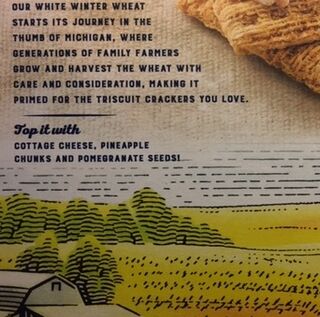Friends
The Opposite of Isolation Is Connection, Grab It! Share It!
Can't share a meal with your family and friends? Then share a recipe.
Posted October 29, 2020 Reviewed by Lybi Ma

Learning about the power of being connected all started with lunch and a box of Triscuits.
Since the onset of Covid-19, I’ve been going to my office. I park my car in my space, come in, shut all the doors, and work.
I don’t meet people for coffee or lunch. Don’t run errands. Don’t hang out with my upstairs tenant. My downstairs tenant has chosen not to come into the office because her husband is immune compromised. I understand. She’s worried. I don’t blame her.
I work alone and I eat lunch alone. Crackers and cheese mostly and a piece of fruit. Sometimes peanut butter and crackers. You know the Covid drill. Keep it simple. Let’s just get through this.
While I was waiting for my tea to boil the other day, I pulled a box of Triscuits out of the cupboard to prepare my lunch and started reading the back of the box. There it was: “Our white winter wheat starts its journey in the Thumb of Michigan, where generations of family farmers…”
I know a fourth-generation family farmer in the Thumb of Michigan. Dennis Shoemaker is married to my best friend from high school, Sue. They own 158 acres; their son, Trent, who has taken over the management of the family farm, owns 500 acres; and they rent another 1,800 acres, on all of which they grow wheat, corn for ethanol, and soybeans. Last year, Trent’s 11-year-old son, Ryan, joined his father and grandfather on the farm. He drives the grain cart.
I called my friend Sue to ask if Dennis and Trent grow the wheat for my Triscuits.
The answer? They don’t grow winter white wheat for Triscuits, but the softer, red wheat that is ground for bread flour.
Even before the pandemic, my husband baked most of our bread.
There it was. A connection.
That’s it, isn’t it? We are all looking for ways to connect.
That’s what’s missing in this self-isolating, careful time.
I was so delighted to make this connection. I have told everyone I know about Dennis and his farm, and that he grows the wheat that we are all using these days to bake bread. Lots of bread, because we have the time and the need to feel creative.
Connections.
A couple days later, another great friend, Eric Woodall, delivered a container of fudge to our door. Magical stuff, indeed. And, it came with a delicious story about connection.
His grandmother, Louise Woodall, was a great mystery fan, and the recipe she used to make her fudge came from the “Murder She Wrote” cookbook.
Louise used a certain pot to make her fudge. No one in Eric’s family was able to make the fudge the way she made it, except for the one time his brother succeeded. She gave him her special pot. But, then, he lost it.
Eric recently bought a pot on eBay like his grandmother’s. Now, he can make fudge just like she did.
He sent me an email with his story saying that, when he makes the fudge, he feels her smiling down on him.
“We had a special bond,” he says.
Connections.
We have a long winter ahead and much care to take with each other as we struggle to contain the pandemic and heal our country.
It’s time to reconnect with friends and family. Not in person, perhaps, but through letters and phone calls and food.
Share a recipe with a friend. Tell a story about where it came from. Connect.
Every time you bake a loaf of bread, whisper a thank you to my friend Dennis and his son who grew the wheat for your bread flour.
Then, cross your fingers and make a wish that someone you know leaves a box of fudge at your door and tells you about finding a candy pot, just like the one their grandmother used.
If there ever was a time, now is the time, to make a batch of cookies, cook up a pot of melt-in-your-mouth fudge, bake a loaf of bread, or any other family recipe that makes you feel connected, and share that delicious connection with a friend.




